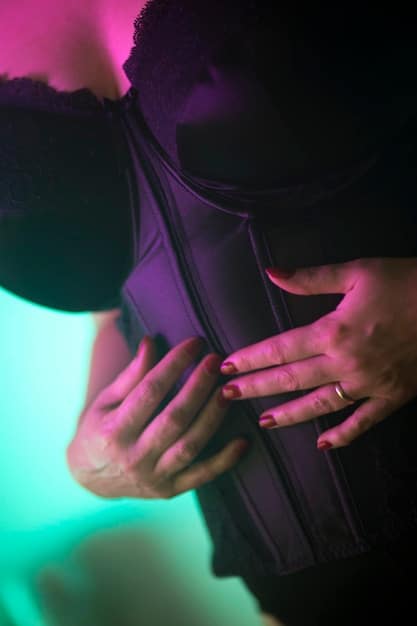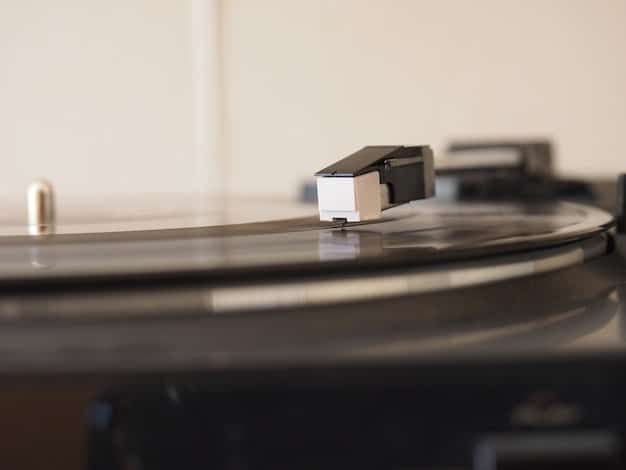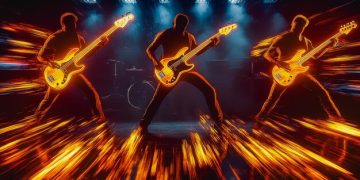Music Copyright Law for Emerging Rock Artists: Protect Your Songs

Music copyright law is essential for emerging rock artists to protect your intellectual property, ensuring you retain control and receive due credit and compensation for your creative work.
Navigating the music industry as an emerging rock artist can be exciting, yet complex. Understanding music copyright law is crucial for protecting your intellectual property. This guide will provide you with essential information to safeguard your creations and career.
Understanding Music Copyright Law for Rock Artists
Music copyright law is the legal framework that protects the rights of creators of original musical works. For emerging rock artists, grasping these laws is vital for maintaining control over your music and ensuring you get proper recognition and compensation for your work.
Copyright protects not just the songs themselves but also the lyrics, musical arrangements, and recordings. This protection extends to various usages, including reproduction, distribution, performance, and adaptation.

Fundamentals of Copyright
Copyright law grants certain exclusive rights to music creators. Here are fundamental aspects to stay aware of:
- What is Protected: Copyright protects original musical works, including compositions (music and lyrics) and sound recordings.
- Who Owns the Copyright: Typically, the composer and lyricist own the copyright to the composition, while the recording artist and record label own the copyright to the sound recording.
- Duration of Copyright: In the United States, copyright protection generally lasts for the life of the author plus 70 years. For corporate works (e.g., recordings owned by labels), the duration is typically 95 years from publication or 120 years from creation, whichever expires first.
Understanding these basics ensures you know what you’re protecting and for how long.
Copyright protection begins automatically as soon as an original work is fixed in a tangible medium, such as written sheet music or a digital audio file. While registration isn’t mandatory, it provides significant legal advantages, such as the ability to sue for infringement and claim statutory damages.
In summary, a solid grasp of copyright fundamentals is your first line of defense in protecting your musical legacy.
Securing Your Music Copyright
Securing your music copyright involves several key steps. Protecting your original works is crucial for any emerging artist. By following these guidelines, your work can be secure so compensation for your work can be guaranteed.
The U.S. Copyright Office provides official registration for copyrights. This is an important step to protect your music. Here are some of the factors to consider:
Copyright Registration Process
Registering your copyright with the U.S. Copyright Office establishes a public record of your claim and provides legal benefits.
- Prepare Your Application: Gather all relevant information about your work, including the title, author, and creation date.
- Submit Your Work: You can register your work online through the Electronic Copyright Office (eCO) system.
- Pay the Fee: There is a fee associated with copyright registration, which varies depending on the type of work and the method of submission.
Registering your song online is a more efficient option. You may register a collection of songs as a single unit, which is a cost-effective approach.
Benefits of Registration
Registration offers several advantages.
- Legal Recourse: Registration allows you to sue for copyright infringement in federal court.
- Statutory Damages: Registered works are eligible for statutory damages and attorney’s fees in infringement lawsuits, which can be significant.
- Public Record: Registration creates a public record of your copyright claim.
Registering your music serves as official proof of ownership and provides additional legal leverage in case of infringement.

Once registered, it’s simpler to defend your property. Secure your music and get it registered to protect your work.
Understanding Performance Rights Organizations (PROs)
Performance Rights Organizations (PROs) play a crucial role in managing and collecting royalties for songwriters and publishers. Knowing how they operate is essential.
PROs like ASCAP, BMI, and SESAC act as intermediaries between music creators and music users, ensuring that artists are compensated when their music is performed publicly.
Role of PROs
These organizations monitor public performances of copyrighted music and collect royalties on behalf of their members.
- Public Performance: Includes radio airplay, live performances, streaming, and background music in businesses.
- Licensing: PROs issue licenses to businesses and organizations that use music, allowing them to legally play copyrighted songs.
- Royalty Distribution: PROs distribute collected royalties to songwriters and publishers based on the number of times their music is performed.
Public performances go beyond just concerts. If you play a music track at your business, royalties should be paid.
Joining a PRO
Becoming a member of a PRO allows you to receive performance royalties for your songs.
- Eligibility: Songwriters and publishers are eligible to join a PRO.
- Application Process: Each PRO has its own application process and membership requirements.
- Affiliation: You can only affiliate with one PRO at a time.
Each PRO has its benefits and considerations. By joining a PRO, you entrust them to track and collect royalties on your behalf. Consider factors like membership fees, royalty distribution methods, and additional services offered.
PRO’s play a vital role in the music ecosystem, ensuring that artists are fairly compensated for the public performance of their work.
Copyright Infringement: What to Do
Copyright infringement occurs when someone uses your copyrighted work without permission. Knowing how to respond is essential.
Identifying and addressing copyright infringement is essential for protecting your rights. If you believe your music is being used without authorization, take prompt action.
Recognizing Infringement
Infringement can take various forms, from unauthorized reproductions to public performances.
- Unauthorized Use: Using your music without permission, such as in a film, advertisement, or another artist’s song.
- Distribution: Selling or distributing unauthorized copies of your music.
- Public Performance: Performing your music publicly without obtaining the necessary licenses.
Copyright infringement has severe consequences, including financial penalties and legal action.
Steps to Take
If you discover copyright infringement, there are several steps you can take to enforce your rights.
- Cease and Desist Letter: Send a formal letter to the infringing party demanding that they stop using your music.
- DMCA Takedown Notice: If the infringement is online, send a takedown notice to the platform hosting the content.
- Legal Action: If the infringement continues, you may need to file a lawsuit to enforce your copyright.
Copyright infringement is a serious issue that requires prompt and decisive action. By understanding your rights and taking appropriate steps, you can protect your music and ensure you are compensated for its use.
It is important to seek legal advice if and when copyright infringement occurs. Proper counsel is valuable, and a lawyer can guide you on the best course of action.
Creating and Using Cover Songs Legally
Cover songs are a popular way for artists to showcase their talent while paying homage to their influences. However, it’s essential to understand the legal requirements for creating and distributing cover songs.
A cover song is a new recording of a previously released song. While recording a cover song may seem simple, you must obtain the necessary licenses to avoid copyright infringement.
Mechanical Licenses
To legally record and distribute a cover song, you need a mechanical license.
- What It Is: A mechanical license grants you the right to reproduce and distribute a copyrighted song.
- How to Obtain: You can obtain a mechanical license through organizations like the Harry Fox Agency (HFA) or directly from the copyright owner.
- Statutory Rate: In the United States, the current statutory rate for mechanical licenses is set by law and adjusted periodically.
By obtaining a mechanical license, you ensure that the copyright owner is compensated for the use of their song.
Streaming and Online Distribution
For streaming and online distribution, you also need to ensure you have the necessary licenses.
- Digital Mechanical License: Required for digital downloads and interactive streams.
- Performance License: Streams and platforms like YouTube also require performance licenses, which are typically handled by PROs.
Navigating the legal requirements for cover songs can be complex, but it’s essential to ensure you are complying with copyright law.
Failure to comply can lead to legal action, so always secure the necessary licenses before recording and distributing a cover song.
The Importance of Music Publishing Agreements
Music publishing agreements are critical for songwriters and composers to manage and monetize their copyrights. Knowing the basics of these agreements is key to protecting your royalties.
A music publishing agreement is a contract between a songwriter and a music publisher, where the songwriter assigns some or all of their copyright to the publisher.
Key Terms to Understand
Understanding the key terms of a publishing agreement is crucial for making informed decisions.
- Copyright Assignment: The transfer of copyright ownership from the songwriter to the publisher.
- Royalties: The percentage of revenue the songwriter receives from the exploitation of their songs.
- Term: The duration of the agreement, which can range from a few years to the life of the copyright.
A solid understanding of music publishing agreements is crucial for safeguarding your creative and financial interests.
Types of Publishing Agreements
Different types of publishing agreements offer varying levels of support and control.
- Full Publishing Agreement: The publisher owns all rights to the songs and receives a larger share of the royalties.
- Co-Publishing Agreement: The songwriter retains a portion of the publishing rights and a share of the publishing royalties.
- Administration Agreement: The publisher administers the songs but does not own the copyright.
The best publishing agreement for you will depend on your career goals and the level of control you wish to maintain over your music.
As an emerging artist, familiarize yourself with publishing contracts so you understand them. These agreements define the terms surrounding royalty payments, intellectual property, and publishing conditions.
| Key Point | Brief Description |
|---|---|
| 📝 Copyright Registration | Register your original music with the U.S. Copyright Office for legal protection. |
| 🎵 PRO Membership | Join a Performance Rights Organization (PRO) to collect royalties for public performances. |
| 🛡️ Copyright Infringement | Take action against unauthorized use of your music by sending cease and desist letters. |
| 📜 Cover Songs | Obtain mechanical licenses to legally record and distribute cover songs. |
FAQ
▼
Register your music online through the Electronic Copyright Office (eCO) system provided by the U.S. Copyright Office. Be sure to gather all relevant information about your work, including the title, author, and creation date.
▼
A PRO, such as ASCAP, BMI, or SESAC, collects royalties for songwriters and publishers when their music is performed publicly. Public performances include radio airplay, live performances, streaming, and background music in businesses.
▼
If you discover copyright infringement, send a cease and desist letter to the infringing party demanding they stop using your music. If the infringement is online, send a takedown notice to the platform hosting the content.
▼
Yes, you need a mechanical license to legally record and distribute a cover song. You can obtain a mechanical license through organizations like the Harry Fox Agency (HFA) or directly from the copyright owner.
▼
A music publishing agreement is a contract between a songwriter and a music publisher. In it, the songwriter assigns some or all of their copyright to the publisher, who then manages and monetizes the copyrights for royalty payments.
Conclusion
Protecting your music is fundamental to a successful career as an emerging rock artist. Understanding and adhering to music copyright law ensures your hard work and creativity are recognized and compensated. By taking the necessary steps to register your music, join a PRO, and understand your publishing agreements, you can safeguard your creative works and build a sustainable career in the music industry.





